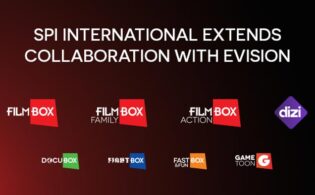Loni Farhi has built SPI International from the ground up—from its days as a content distributor primarily focused on Eastern Europe to its status now as a global media company operating 40 television channels on six continents. Working with more than 1,400 operators worldwide, SPI reaches 55 million subscribers with its linear and on-demand content, including live streaming of UHD programming and flagship FilmBox channels. Its recent acquisition of the Film1 movie service in the Netherlands is but one example of the ways in which SPI is still growing in the global marketplace. Farhi, president of SPI International, talks to World Screen about how the company’s various business lines are performing.
WS: When the company was founded, it focused purely on content distribution. What drove the entry into the channels business?
FARHI: SPI started in 1987 and by 1991 was running as a content distribution company that was active in multiple countries. Throughout the ’90s, we grew to reach all Eastern European countries, some parts of [Central] Europe, South Africa and Portugal. There were thousands of hours of content built up in the library.
I remember the day we bought Kino Polska. It took us almost six months to turn it around and make it into a success story. Then the group created the FilmBox brand. We came to our board and said that FilmBox is on its way up and should be part of Kino Polska. They trusted us and went for it. Today, after all these years, FilmBox is the shining star of Kino Polska. The channel is thriving.
Consistency and persistence are part of my motto. If you want something bad enough, there’s very little out there to stop you. And here we are today! After a couple of decades, we are now a huge global content company, producing its own original content, and we operate 40 television channels on six continents.
WS: What’s driving the growth of SPI’s channels business internationally?
FARHI: The platforms are essential for us. We have a very clear understanding of what their clients want in terms of content. We are now offering our content in different forms: linear, on-demand and through interactive platforms. Digital-business growth is a key driving factor for our channels. We work with over 1,400 operators worldwide and strive to provide our 55 million subscribers with very strong VOD content, whether it’s premium movies or thematic programs from our thematic channels. We are essentially creating branded corners within the operators’ set-top boxes or apps with this strong library, turning them into very good on-demand content providers.
Another driving factor when it comes to our channels’ success is the quality of our content. We are acquiring and producing very high-quality content and distributing it globally. We have different genres of channels. We can create channels based on different countries and the needs of the local market.
One of our relatively newer channels, Timeless Drama Channel (TDC) is the first global Turkish drama channel and aims to connect all drama-genre lovers through universal themes and values. We have a long history with one of the best producers from Turkey, Ay Yapim. This partnership has helped us significantly in making TDC a global phenomenon with over 600 hours of fresh content and critically acclaimed dramas. The channel is already on 15 platforms and is growing rapidly.
WS: What factors went into the decision to begin producing original content?
FARHI: This decision came from the content department actually, though the channels business is certainly going to benefit from it as well. In one year, our content sales doubled. Nowadays, the demand for original content has increased immensely, and we knew we needed to become part of it.
SPI has a deal with the renowned movie director and producer Philippe Martinez. This partnership calls for two trilogies, a TV series and a movie. Salvage Marines is a brand-new series based on a book by Sean-Michael Argo. Mister Mayfair is a trilogy and the leading project. I just screened a couple of clips from it that Philippe sent me and they’re so well done, it’s really impressive! It’s a mafia comedy, and the chemistry of the cast is extraordinary. It also features original songs. The Intergalactic Adventures of Max Cloud, starring Scott Adkins and Tommy Flanagan, is sci-fi action-comedy at its best and is produced by Goldfinch Studios. Last but not least, Miss Willoughby & Bentley is a trilogy about a beautiful crime-solving professor.
I am going with Philippe to Poland and Turkey to discuss two new projects to co-produce. These are core countries, so it’s great to have our first requests for original co-productions from there. We are open to any and every country where we can find a good project and good partners. This is going to be a beautiful additional pipeline for the company.
WS: How is the company expanding its digital offerings?
FARHI: It’s going extremely well! Compared to last year, we tripled our revenues with FilmBox Live and FilmBox On Demand. This year should be a record year for digital. Next year, the plan is to double what we did this year.
Unlike many companies operating digital platforms, SPI is not burning any money. Every business we enter has to be profitable for us. We took a very pragmatic approach to OTT, and we are very happy with our OTT division. It’s very young, dynamic and efficient. We have launched our services with almost all of the platforms that our channels are on. However, we are very cautious about D2C [direct-to-consumer] distribution when it comes to OTT. We are giving it a try in a couple of countries but on a small scale. We’ll see how it works.
WS: As content distribution continues to be a strong pillar of the overall business, what’s the windowing strategy you’ve carved out?
FARHI: So far, we have doubled our sales revenues compared to last year. I have been leading our content department since inception. I know that in our business, content is the king. If you know how to handle content, everything else is secondary. This is our attitude toward content, and we know the importance of windowing. We have established very solid windowing that gives a good amount of time for the content on our channels, but still respects what we sell and our buyers’ windows. The windowing is done in such a way that we have very little downtime on any of our content. We’ve been careful in achieving this and it’s how we created our channels—and they grew, and they are growing, so we’re doing it right.
WS: What does the Film1 acquisition bring to SPI?
FARHI: It came to our attention at the eleventh hour that Sony wanted to sell Film1. We were interested immediately. We were connected with the right people, and a successful deal was achieved for both parties. It is our foray into Western Europe. We are open and looking for additional possibilities like this.
The channel launched under our leadership on August 1, with double the number of movies. We put it together in less than two months, so that’s a big achievement. The fact that we were able to get a full channel up in 45 days is a miracle [laughs], but we are known for making a lot of miracles into realities.
WS: Are more acquisitions on the horizon?
FARHI: M&A is a solid part of our existence. First came FilmBox being purchased by Kino Polska. Then we made the Stopklatka free-TV channel part of our group. Then the Zoom free-TV channel became part of our group, and we recently acquired Film1. We are already looking into a couple of companies. As long as it touches our business in some way, it’s of interest for us. We are very energetic; we are looking for ways to grow our company—and it is growing.






